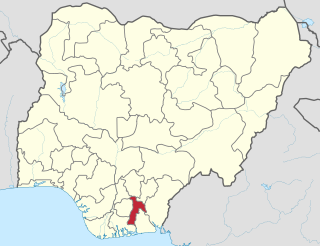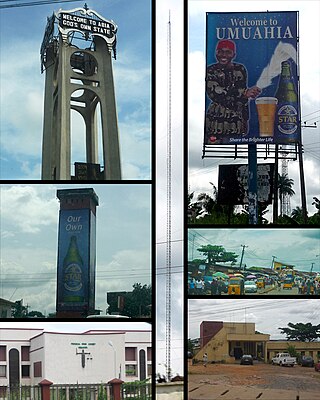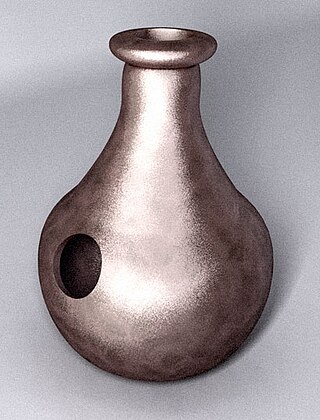
The Igbo people are an ethnic group in Nigeria. They are primarily found in Abia, Anambra, Ebonyi, Enugu, and Imo States. A sizable Igbo population is also found in Delta and Rivers States. Ethnic Igbo populations are found in Cameroon, Gabon, and Equatorial Guinea, as migrants as well as outside Africa. There has been much speculation about the origins of the Igbo people, which are largely unknown. Geographically, the Igbo homeland is divided into two unequal sections by the Niger River—an eastern and a western section. The Igbo people are one of the largest ethnic groups in Africa.

A quinceañera is a celebration of a girl's 15th birthday that is common in Mexican and other Latin American cultures. The girl celebrating her 15th birthday is a quinceañera. In Latin America, the term quinceañera is reserved solely for the honoree; in English, primarily in the United States, the term is used to refer to the celebrations and honors surrounding the special occasion.

Abia State is a state in the South-East geopolitical zone of Nigeria, it is bordered to the northwest by Anambra State and northeast by the states of Enugu, and Ebonyi, Imo State to the west, Cross River State to the east, Akwa Ibom State to the southeast, and Rivers State to the south. Abia is the only Southeastern state that has boundaries with the other four Southeastern states in Nigeria. It takes its name from the acronym for four of the state's most populated regions: Aba, Bende, Isuikwuato, and Afikpo. The state capital is Umuahia while the largest city and commercial centre is Aba.
The music of Saint Lucia is home to many vibrant oral and folk traditions and is based on elements derived from the music of Africa, especially rhythmically, and Western Europe, dances like the quadrille, polka and waltz. The banjo and cuatro are iconic Lucian folk instruments, especially a four-stringed banjo called the bwa poye. Celebratory songs called jwé show lyricism, and rhythmic complexity. The most important of the Afro-Lucian Creole folk dances is the kwadril. Music is an integral part of Lucian folk holidays and celebrations, as well as the good-natured rivalry between the La Rose and La Marguerite societies. There is little Western classical music on Saint Lucia, and the country's popular music industry is only nascent. There are few recording opportunities, though live music and radio remain a vital part of Lucian culture. Popular music from abroad, especially Trinidadian styles like calypso and soca, is widespread.

Umuahia is the capital city of Abia State in southeastern Nigeria. Umuahia is located along the rail road that lies between Port Harcourt to its south,and Enugu city to its north. Umuahia has a population of 359,230 according to the 2006 Nigerian census. Umuahia is indigenously Igbo.
Arochukwu Local Government Area, sometimes referred to as Arochuku or Aro Oke-Igbo, is the third largest local government area in Abia State in southeastern Nigeria and homeland of the Igbo subgroup, Aro people.
Big Drum is a genre, a musical instrument, and traditional African religion from the Windward Islands. It is a kind of Caribbean music, associated mostly closely with the music of Saint Vincent and the Grenadines, Music of Guadeloupe, Carriacou in Grenada and in the music of Saint Kitts and Nevis.

Igbo music is the music of the Igbo people, who are indigenous to the southeastern part of Nigeria. The Igbo traditionally rely heavily on percussion instruments such as the drum and the gong, which are popular because of their innate ability to provide a diverse array of tempo, sound, and pitch. Igbo music is generally lively, upbeat, and spontaneous which creates a variety of sounds that enables the Igbo people to incorporate music into almost all the facets of their daily lives. Some very popular Igbo musical styles are Igbo highlife, Ogene, Igbo gospel.

The Aro people or Aros are an Igbo subgroup that originated from the Arochukwu kingdom in present-day Abia state, Nigeria. The Aros can also be found in about 250 other settlements mostly in the Southeastern Nigeria and adjacent areas. The Aros today are classified as Eastern or Cross River Igbos because of their location, mixed origins, culture, and dialect. Their god, Chukwu Abiama, was a key factor in establishing the Aro Confederacy as a regional power in the Niger Delta and Southeastern Nigeria during the 18th and 19th centuries.

In many parts of sub-Saharan Africa, the use of music is not limited to entertainment: it serves a purpose to the local community and helps in the conduct of daily routines. Traditional African music supplies appropriate music and dance for work and for religious ceremonies of birth, naming, rites of passage, marriage and funerals. The beats and sounds of the drum are used in communication as well as in cultural expression.
Ubakala is a large town in Umuahia South Local Government Area (LGA) of Abia State, Nigeria. It is one of the major ancient clans of Umuahia. A popular market for which it is known is the Apumiri Market. Umuahia South Local Government Area Headquarters is located at Apumiri as well. Ubakala is situated southwards of Umuahia main township. Its well defined boundaries geographically places it at the North of Ntigha.
Umukabia[Ojim Ukwu Nnu Egbe] is a village in the Ohuhu community of Umuahia North Local Government Area, Abia State, Nigeria. There are also several other villages in Nigeria with the same name. Umukabia comprises 3 small villages namely; Okpuala being the eldest, followed by Umuagbom and Azummiri. Within these 3 small villages are 6 compounds-For Okpuala, they comprise-Agbom Na Omurumba and Umu Eze Aguma. Azumiri is regarded as a single compound. In the case of Umuagbom, there are three compounds, namely, Umuezeocha, Ibeneze also Uhu Ukwu Na Ezegiri and Ukwu Udara. Noteworthy is that each of these compounds finds further sub-divisions, comprising family units, each headed by a patriarch, usually the oldest male member of that family unit. This oldest male is also regarded as the ultimate repository of the knowledge, cultures and traditions of the family unit and sometimes Umukabia as a whole. He performs all the rituals and ceremonies regarding the compound and seeks reciprocals with the ancestors through oracles and ritualizations. These elders or patriarchs constitute Umukabia's democratic dispensation and policy making unit, in that they collectively make and take decisions on behalf of the entire Umukabia community. Whatever decisions they make is binding across the village and even beyond to Diasporic sons and daughters of Umukabia. Umukabia's renowned market day is known as Orie Umukabia Orie. Umukabia has a major river known as Ikwu, which traverses the villages in Umuire, Umuegwu Okpula Former Eastern Nigeria Premier, Dr. Michael Iheonukara Okpara's village and flows into the famous Imo River basin Imo/Abia States, Nigeria.Legend has it that Umukabia sits on a large rock which has made it impossible for bore holes to be successfully dug in any part of the village for the purposes of extracting water. The village holds annual ceremonies known as Iri Ji festival and Ekpe festival which is termed as the village Christmas and holds on an Orie market day after Christmas but never on a Sunday.
Bright Chimezie is a Nigerian musician known for his influential music style called Zigima Sound. Hailing from Abia State, Nigeria, Chimezie rose to fame in the early 1980s with his unique blend of traditional Nigerian music, Igbo highlife, and chanted vocals. His music also addresses societal issues such as colonialism, economic exploitation, and cultural identity with a touch of humor in his lyrics.
Igbo culture are the customs, practices and traditions of the Igbo people of southeastern Nigeria. It consists of ancient practices as well as new concepts added into the Igbo culture either by cultural evolution or by outside influence. These customs and traditions include the Igbo people's visual art, music and dance forms, as well as their attire, cuisine and language dialects. Because of their various subgroups, the variety of their culture is heightened further.
The Isu people are the second largest subgroup of the Igbo people of Nigeria. Isuama, in which the purest Igbo is said to be spoken, is to be found the heart of the Igbo nationality; consequently it is quite reasonable to look among its people for the original fountain-head from which all the other clans have sprung. This inference too is supported not only by the purity of the language, but by this right of dispensing or rather of confer-ring royalty which is undoubtedly the prerogative of the Nri or N'shi people. In the pre-colonial era, the Igbo people were protected from external invasion by the dense forests of the region, which also had the effect of encouraging diversity. Thus as warriors the neighboring Oratta (Uratta) people looked down on the Isu people, who were traders.

Ijele Masquerade, known as the biggest Masquerade in Sub-Saharan Africa, is a tradition of the Igbo people of Nigeria and was listed in the UNESCO Archives as an intangible cultural element in need of urgent safeguarding. In many communities in the state of Anambra in South-Eastern Nigeria, celebrations, burial ceremonies and other special occasions during the dry season to evoke fertility and a bountiful harvest feature the performance of the Ijele masquerade.
The Waawa clan of Northern Igboland, also referred to as Ndi Waawa, Wawa People, are a unique sub-group of the Igbo people in Enugu and Ebonyi State, Nigeria, consisting of several communities, who all speak a unique dialect of Igbo called Waawa. The most notable among these are the Agbaja and Ngwo which consist of peoples between the wooded lands of Awka to the rocky valleys of Enugu. The Agbaja are made up of communities in present-day Ngwo clan, Udi, Ezeagu, Umulokpa, Igbo-Etiti, Oji River, greater Awgu, Odume, Ndiagbor, Nenwe, Mpu, Okpanku and Enugu East Local Government Areas. Other notable parts of the Waawa clan include Nkanu, Nsukka, Abia, Nike, Agbani, Owo, and other communities in Enugu State. The Waawa are most notably associated with Chief Onyeama's people from Eke, who was the paramount ruler of Agbaja in the early 20th century.

Igbo literature encompasses both oral and written works of fiction and nonfiction created by the Igbo people in the Igbo language. This literary tradition reflects the cultural heritage, history, and linguistic diversity of the Igbo community. The roots of Igbo literature trace back to ancient oral traditions that included chants, folk songs, narrative poetry, and storytelling. These oral narratives were frequently recited during rituals, childbirth ceremonies, and gatherings. Proverbs and riddles were also used to convey wisdom and entertain children.

Folk dances of Sindh are the traditional dances of the Sindhi people, which are indigenous to Sindh region which is now in Pakistan. These dances are performed at various events including marriages, ceremonies, special occasions, on birth of a child and for cultural purposes.









